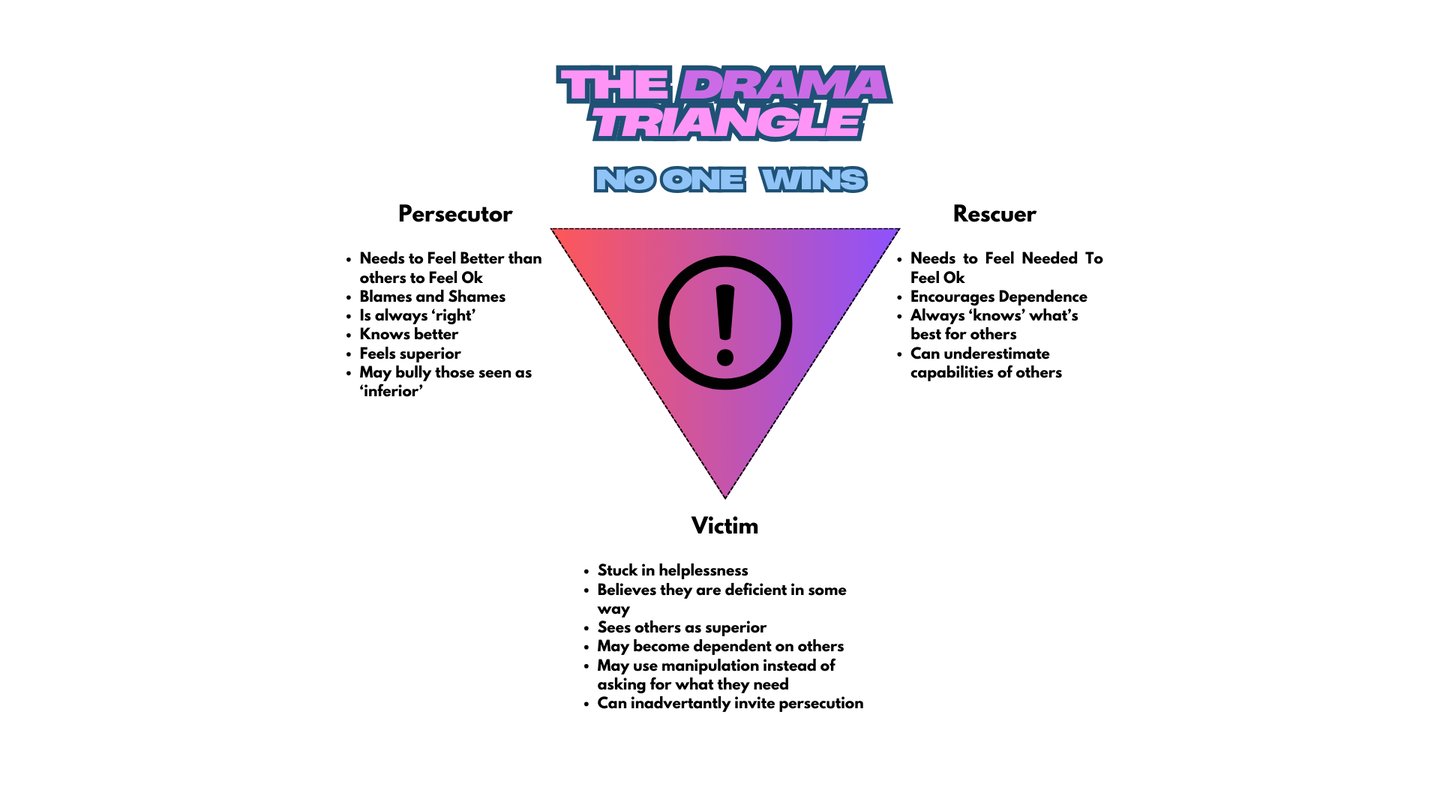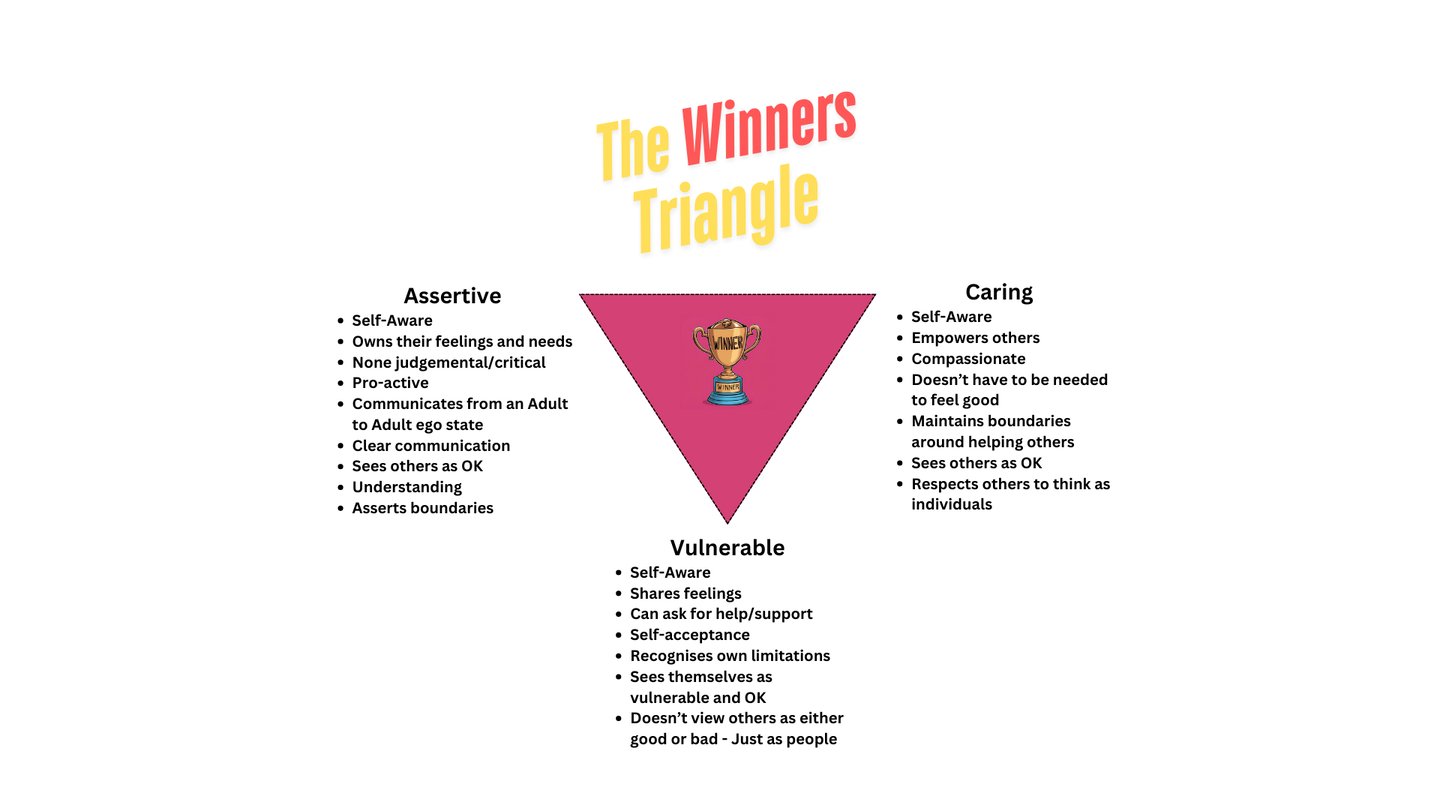From Drama to Winner


The Karpman Drama Triangle is a social model of interaction created by psychiatrist, Stephen B. Karpman in 1968.
It models how dysfunctional relationships, counter-productive communication and co-dependancy are maintained.
People may favour certain 'life script' roles in the triangle, but they may also switch around dynamically in the Drama Triangle so you never know what to expect.
All of the roles reinforce communicating from a wounded self; Maintaining drama and preventing healthy boundaried relationships.
If you grew up with toxic, abusive or preoccupied family dynamics, you were more than likely exposed to these repeated stressful interactions. Some parents may have even competed against each other for the role of Victim, while you (the scapegoat) were blamed for everything! Being placed unfairly in the role of Persecutor (the baddie) if you tried to stand up for yourself, it really did seem like there was no way out.
As an adult, insight and self-awareness can help you to step out of the Drama and into the Winner's Triangle - Out of dysfunction and into healthy patterns of relating.


The Winners Triangle (Acey Choy 1990) encourages us to use our Adult ego state and be mindful of our Parent and Child ego state influences in our responses to people and the world. This is achieved by acting consciously with here and now awareness of our feelings, thoughts and patterns of behaviour. We can then judge whether we are responding to a situation in a way that is functional or we are reacting according to past experiences.
Persecutor to Assertive Non-blaming/shaming. Owning your feelings – e.g. ‘I felt… when you said’, instead of, ‘You made me feel …’. Taking responsibility for self and not coming from a critical place to punish. Uses facts, sets boundaries, expresses needs clearly instead of using anger or manipulation.
Rescuer to Caring Aware of urge to swoop in to ‘help’ or take over control - Which keeps others in the victim position. Instead encourages and support others to be independent and resilient. Respect others choices and boundaries, know what is your responsibility when to be step back and protect your own energy. Listen and be there for someone rather than telling them what they ‘should’ do. Be aware of your own need to rescue or whether you are responding to others expectations.
Victim to Vulnerable The Victim position keeps us in a passive, helpless place, feeling under attack and stuck, waiting for help. It may feel like denial to say we aren’t a victim, many of us have endured negative treatment from others and may still be. However, acknowledging we are Vulnerable also covers this, without trapping us in our own heads by listening to and believing the inner critic that punches down on us. Being Vulnerable means asking for help and support when we need it, being responsible as much as we can be for our own boundaries and care, rather than rejecting or neglecting ourselves as others have done in the past.
Vulnerability is about owning that we have wounded parts without giving all our power to others and becoming totally dependent on external factors for our moods and self-care.
Those with Cptsd are vulnerable simply because they have had to be strong for so long without the support of others, so now they burn through their energy quickly. We reacted normally to an adverse situation that we couldn't escape from. Our bodies and minds aren't built to experience chronic long-term threat, yet we are still here, and yes it has affected us.
A lot of people with Cptsd will recognise the Drama Triangle patterns in their families and carers. If you have a narcissistic parent or partner, they often favour the Persecutor and Victim positions. While you might have been given the role of Rescuer especially when they were indulging their victimhood. When you reacted to their Persecutor behaviour or challenged them, you became the Persecutor, while they became the Victim. You would then have to Rescue them and apologise or try to make them happy with you – Exhausting!!
The strange thing is that the Drama Triangle can be seen everywhere from politics to reality TV, at work, friendship groups and in our favourite stories. Obviously it varies in its extremes and potential for destructive consequences. But there is no doubt that in a dysfunctional family, it compounds trauma and makes life more limited with roles that restrict autonomy and growth.
The Winners Triangle supports good healing, growth and individuality, healthy things we weren't allowed as children.
You deserve to be able to choose how you respond.
